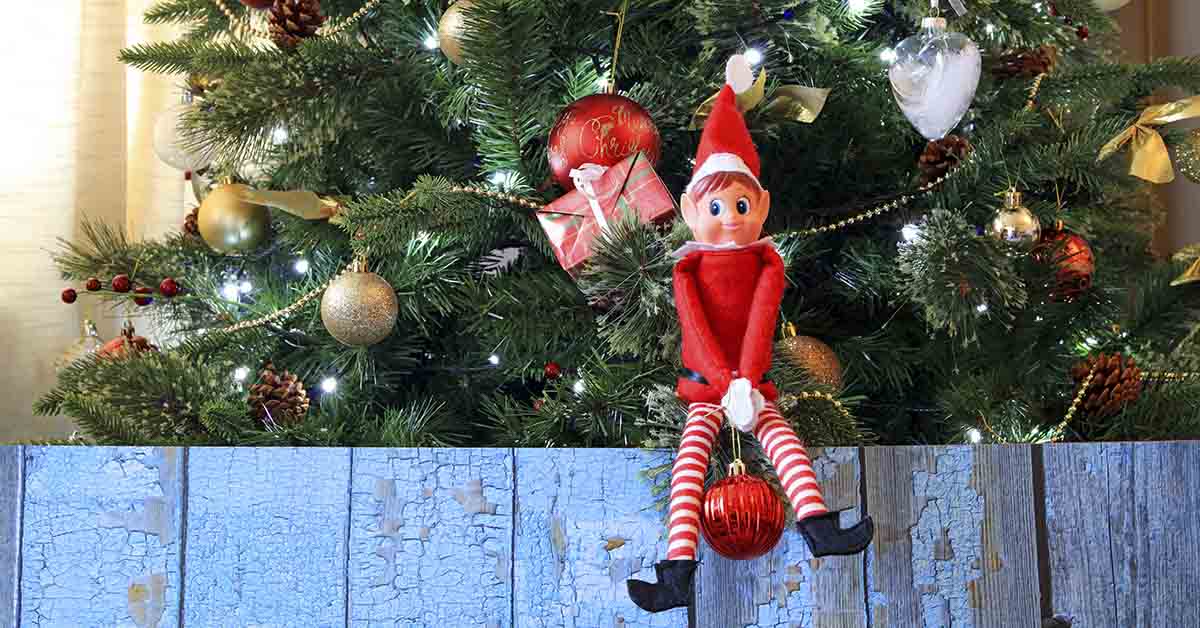Back in 2014, Psychologist Tim Kasser, a professor at Knox College, was associated with claims that the widely popular holiday tradition of Elf on the Shelf can be “damaging” for kids. These articles are being circulated again, with people asking themselves the question: Should I be including Elf on the Shelf in my family’s Christmas traditions? This is what Kasser has to say.
The Controversy of Elf on the Shelf
The concept behind Elf on the Shelf involves a toy elf named Frisbee being placed around the house by parents from Thanksgiving until Christmas Eve. The elf is Santa’s personal dispatch and is said to watch over children to see if they’ve been well-behaved. If deemed “good enough,” they’ll receive gifts from Santa on Christmas morning. Of course, the idea is that parents have additional “help” during the holiday season to keep their children’s behavior in check.
According to Kasser, Elf on the Shelf perpetuates the idea that gifts and material rewards are the only way to motivate good behavior. According to him, this leads to children feeling insecure and materialistic. He argues that this message could be detrimental to children’s long-term well-being, as studies have shown that prioritizing materialistic goals leads to a lower level of satisfaction in life.
“There’s a very clear message with something like [Elf on the Shelf] and with the whole Santa Claus ‘naughty or nice’ concept, which is: If you’re good, you’ll get stuff,” Kasser explained. (1)
Kasser has studied extensively the links between materialism and our mental and physical health. Though perhaps not a big surprise, the more we rely on material things for happiness, the less happy we are overall. Unfortunately, society seems to teach the opposite from a very young age. During the holidays, the message more stuff = better life is stronger than ever. As parents, we need to figure out how to combat these messages.
Read: Mentally Strong Kids Have Parents That Do These 10 Things
“My colleagues at the University of Sussex and I recently published a meta-analysis that showed the negative relationship between materialism and well-being was consistent across all kinds of measures of materialism, types of people, and cultures,” Kasser explained. “We found that the more highly people endorsed materialistic values, the more they experienced unpleasant emotions, depression and anxiety, the more they reported physical health problems, such as stomachaches and headaches, and the less they experienced pleasant emotions and felt satisfied with their lives.” (2)
Other Psychologists Agree
Daniel Cook, Professor of Childhood Studies and Sociology at Rutgers University-Camden, agreed with Kasser. He also believes that Elf on the Shelf is causing both parents and children to focus on the wrong things. Good behavior, he says, should involve children learning to respect their parents’ authority. Parents should also teach their kids that being “good,” i.e., kind, benevolent, giving, respectful, etc, is something you should just be. The reason for being this way is not, he says, just so that you will receive something in return.
“It allows parents to displace their authority onto this secondary fantastical being, this elf, that is related to Santa,” Cook said. “In a way, both kids and parents become reliant on this elf on the shelf.”
Does Elf on the Shelf Still Have a Place in the Holiday Season?
However, there are ways to use Elf on the Shelf that steer clear of the emphasis on receiving gifts. Rather than using the elf as a disciplinary tool, parents can use it as a way to encourage generosity and giving. For instance, the elf could be used as a way to encourage children to participate in philanthropic activities, demonstrating that the true spirit of Christmas is about giving rather than receiving.
These could be things such as saving up their own money to buy a gift for someone else, volunteering at a toy drive or food bank, or perhaps having them choose some of their toys to donate to kids less privileged than they have. The idea is to teach kids that being kind to others, helping others, and participating in your community brings with it its own rewards – and those rewards are not more things.
Your Kids, Your Choice
Ultimately, whether or not parents choose to participate in the Elf on the Shelf tradition should be left up to them. While some experts believe that tradition can be damaging to children’s values, others argue that it can be used as a tool to encourage and promote selflessness. As with anything related to parenting, it’s important for parents to carefully consider the values they want to instill in their children, and make decisions accordingly.
Keep Reading: The Benefits of Kissing in a Relationship, According To Psychology
Sources
- “How Parents Could Be Sending The Wrong Message With Elf On The Shelf.” Huffpost. Rebecca Adams. December 17, 2014.
- “Professor Kasser on Materialism and the Holidays.” Knox

